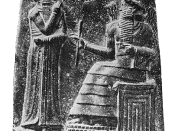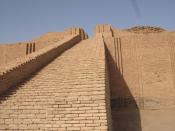Exact dates for the birth, life, and reign of Hammurabi cannot be given. It is assumed that his reign extended from 1792-1750 BC. Hammurabi was the king of Babylonia, and the greatest ruler in the first Babylonian dynasty. He expanded his kingdom to the north of the Persian Gulf. It traveled through the Tigris and Euphrates River valleys and to the coastline of the Mediterranean Sea. After centralizing his profits under a primary government at Babylon, he spent his energies to guarding his boundaries and nurturing the on the inside prosperousness of the nation. Throughout his extensive ruling he individually looked over navigation, irrigation, agriculture, tax collection, and the building of many temples and other structures. Although he was a prosperous military chief and administrator, Hammurabi is essentially remembered for his codification of the laws exercising authority on Babylonian life. The laws were called the Code of Hammurabi, which were the earliest legal body of law known in its entirety.
The heavenly source of the written law is emphasized by a bas-relief in which the king is shown accepting the code from the sun god, Shamash. The code is set down in horizontal columns of cuneiform writing: 16 columns of text on the obverse side and 28 on the reverse. The printed matter starts with an introduction that tells the expansive replacement of the temples and religious cults of Babylonia and Assyria. The code itself, made of 28 paragraphs, appears to be a sequence of amendments to the common law of Babylonia, rather than a stern legal code. It opens with direction for legal procedure and the announcement of punishments for unfair charges, false testimony, and injustice done by judges; then come laws dealing with property rights, loans, deposits, debts, domestic property, and family rights. The parts dealing with personal injury attest that penalties were ordered for injuries sustained through failed operations by physicians and for injuries caused by neglect in different trades. The Code of Hammurabi has no laws concerning religion. These laws seek to protect the poor and weak





